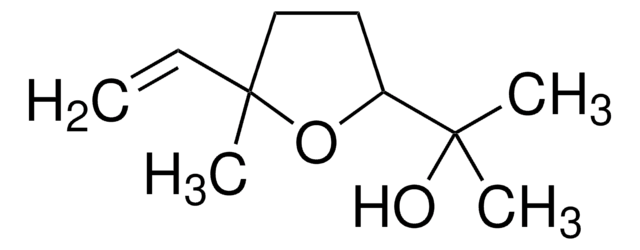W322601
1-Phenyl-1,2-propanedione
98%, FG
Sinónimos:
Acetyl benzoyl
About This Item
Productos recomendados
biological source
synthetic
Quality Level
grade
FG
Fragrance grade
Halal
Kosher
agency
follows IFRA guidelines
meets purity specifications of JECFA
reg. compliance
EU Regulation 1223/2009
EU Regulation 1334/2008 & 178/2002
assay
98%
refractive index
n20/D 1.532 (lit.)
bp
103-105 °C/14 mmHg (lit.)
density
1.101 g/mL at 25 °C (lit.)
application(s)
flavors and fragrances
documentation
see Safety & Documentation for available documents
food allergen
no known allergens
fragrance allergen
no known allergens
organoleptic
honey; buttery; plastic
SMILES string
CC(=O)C(=O)c1ccccc1
InChI
1S/C9H8O2/c1-7(10)9(11)8-5-3-2-4-6-8/h2-6H,1H3
InChI key
BVQVLAIMHVDZEL-UHFFFAOYSA-N
Gene Information
human ... ACHE(43) , BCHE(590) , CES1(1066)
¿Está buscando productos similares? Visita Guía de comparación de productos
Categorías relacionadas
General description
Application
- A Simplified Kinetic Model for the Enantioselective Hydrogenation of 1-Phenyl-1,2-Propanedione over Ir/TiO(2) in the Presence of a Chiral Additive.: This study presents a simplified kinetic model for the enantioselective hydrogenation of 1-Phenyl-1,2-propanedione, emphasizing its potential in synthetic organic chemistry and catalysis, which could have significant implications for pharmaceutical synthesis and industrial applications (Melián-Cabrera et al., 2022).
- Moving Towards a Finer Way of Light-Cured Resin-Based Restorative Dental Materials: Recent Advances in Photoinitiating Systems Based on Iodonium Salts.: Although primarily focused on photoinitiating systems for dental materials, this review could indirectly encompass applications of 1-Phenyl-1,2-propanedione in dental photopolymerization processes, suggesting potential for further exploration in dental material enhancements (Topa and Ortyl, 2020).
signalword
Warning
hcodes
Hazard Classifications
Acute Tox. 4 Oral - Eye Irrit. 2 - Skin Irrit. 2 - STOT SE 3
target_organs
Respiratory system
Storage Class
10 - Combustible liquids
wgk_germany
WGK 3
flash_point_f
183.2 °F - closed cup
flash_point_c
84 °C - closed cup
ppe
Eyeshields, Faceshields, Gloves, type ABEK (EN14387) respirator filter
Elija entre una de las versiones más recientes:
¿Ya tiene este producto?
Encuentre la documentación para los productos que ha comprado recientemente en la Biblioteca de documentos.
Los clientes también vieron
Nuestro equipo de científicos tiene experiencia en todas las áreas de investigación: Ciencias de la vida, Ciencia de los materiales, Síntesis química, Cromatografía, Analítica y muchas otras.
Póngase en contacto con el Servicio técnico












